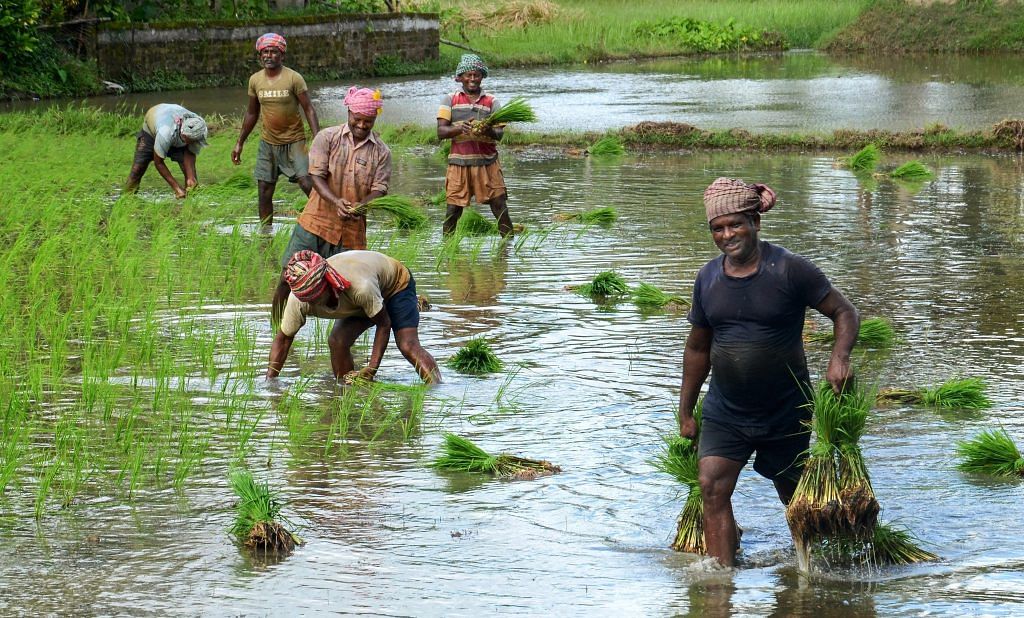New Delhi: In her Budget speech on 5 July, Union Finance Minister Nirmala Sitharaman referred to Zero Budget Natural Farming (ZBNF), and said such steps can help in “doubling our farmers’ income in time for our 75th year of independence”.
Two months on, work on the ZBNF scheme is moving at a snail’s pace, with many in the agriculture ministry, including scientists, continuing to raise doubts over its “viability”.
ZBNF, a low-cost method, involves farming without using any chemicals. It involves application of a mixture of fresh indigenous cowdung and urine along with jiggery, pulses and flour on the soil to be cultivated — which is called ‘jeevamrut’ or ‘jiwamrita’.
Speaking to ThePrint, Trilochan Mohapatra, Secretary, Agricultural Research and Education, said: “Trials are going on in Modipuram (Uttar Pradesh), Ludhiana (Punjab), Pantnagar (Uttarakhand) and Kurukshetra (Haryana). It will take at least two to three years to get results. We will only launch the scheme then.”
Mohapatra added that a team has been constituted under Telangana University vice-chancellor Dr Praveen Rao and Prof. Jaishankar of the same university to oversee the trials. The plan is to expand the tests to 20 other locations.
Also read: Zero-budget farming: Why Budget 2019 isn’t in sync with PM Modi’s promises to farmers
Agriculture scientists advise caution
The ZBNF technique has gained currency since the BJP-led NDA government came to power. The 2018-19 Economic Survey had recommended ZBNF as a cost-effective livelihood option for small farmers.
However, agriculture scientists at the Indian Council of Agricultural Reasearch (ICAR) and the Indian Agricultural Research Institute (IARI) say it could create havoc in the farm sector and lead to a decline in farmers’ income.
“Without multi-agroclimatic location studies, and scientific validation of long-term impact and viability of ZBNF, it should not be scaled up and promoted country-wide. The results can be devastating,” said an ICAR scientist who did not want to be named.
Agriculturist Subhash Palekar in Maharashtra, one of the earliest proponents of ZBNF, has claimed that only one cow is needed to prepare 30 acres of land, but that it should be an indigenous breed and not an imported one. However, IARI scientists say the jeevamrut method is impractical as it is almost impossible for each farmer to have the number of indigenous cows corresponding to the area of farmland he owns.
“There is very little incentive for small-scale farmers to rear indigenous cow breeds, as their milk yield is quite low as compared to the hybrid breeds,” the ICAR scientist said, calling it a “half-baked concept”.
Also read: Modi govt rolls back super-rich tax, announces series of measures to revive economy
‘Soil is now used to chemical input’
A second ICAR scientist said it’s impossible to make a sudden shift to natural farming as the farm soil has already got used to chemical input.
“It will take at least 7 to 10 cropping seasons for the soil to perform to its optimum under chemical-free conditions. During this time, the farmer’s income will decline to an unprecedented level,” he said.
The scientist said one hectare of farmland which produces an average of 60 quintals of wheat requires at least 120 kg of nitrogen, 60 kg of phosphate and 40 kg of potassium as fertiliser.
“One hundred kg of cow dung provides only 250 g of nitrogen to the soil. It will be a Herculean task to ensure the rest of nutrients reach the soil. This makes ZBNF completely irrelevant to the contemporary Indian agriculture scenario,” he said.
Also read: India’s farm economy needs liberalisation, not periodic political charity
